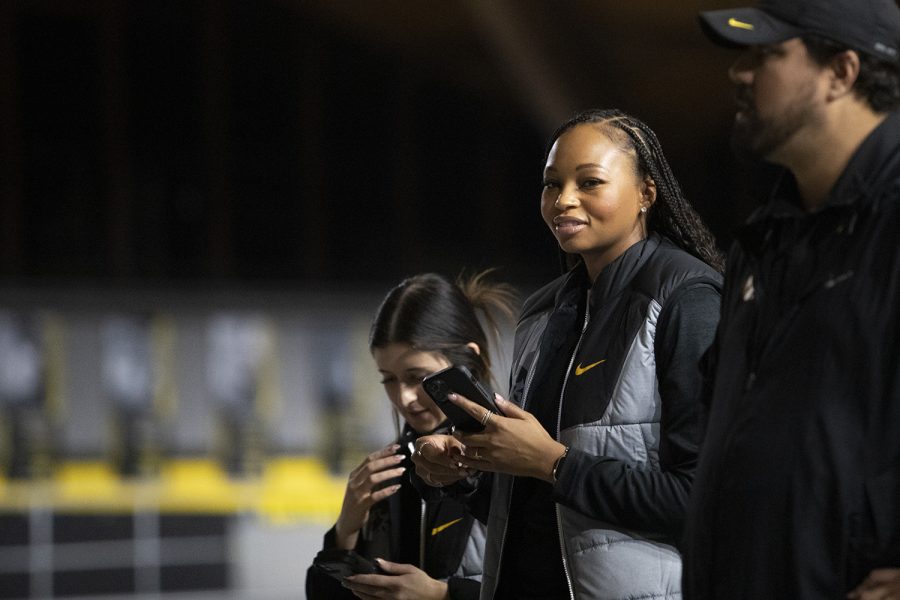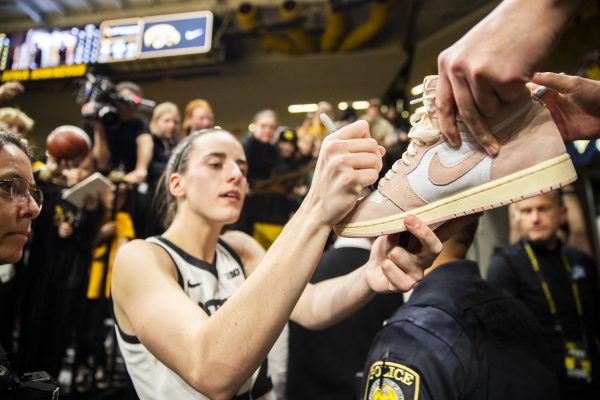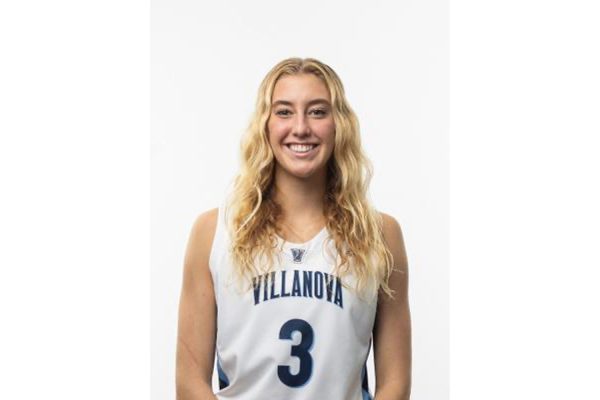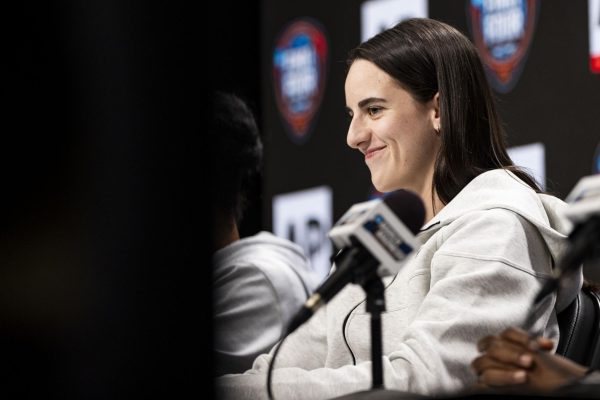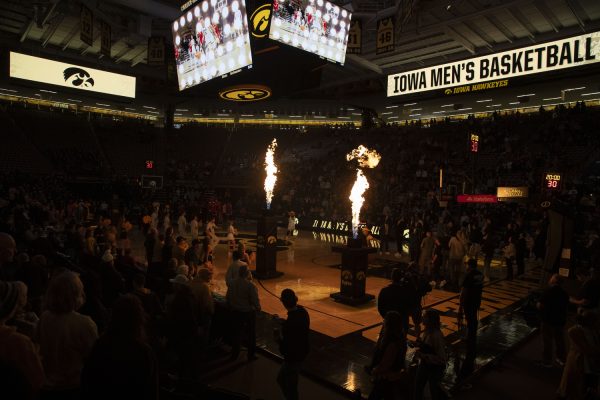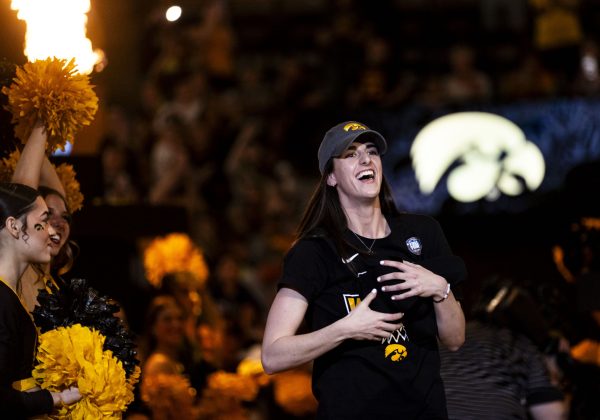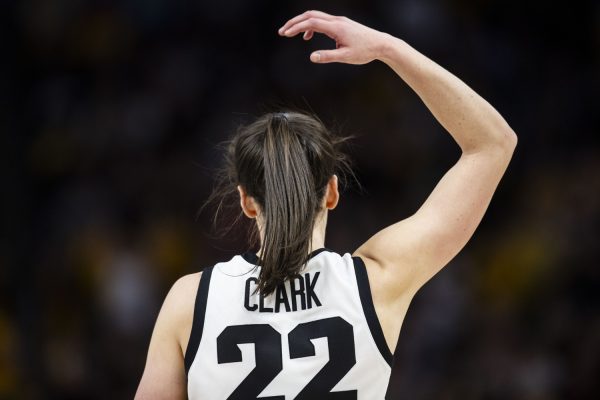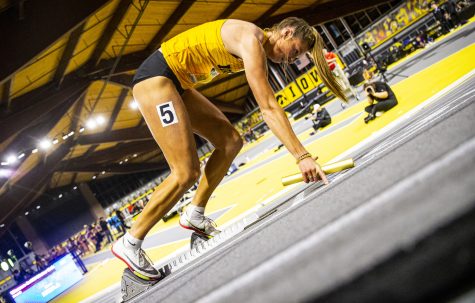New Iowa track and field assistant coach Chyna Davis wants balance effort from athletes
Davis wants what she calls “110 percent” from her athletes but knows that they won’t perform well if “their mind is in five different directions.”
Coach Chyna Davis speaks to the team during the Jimmy Grant Invitational track meet at the the Hawkeye Indoor Track Facility in Iowa City on Saturday Dec. 10, 2022.
December 11, 2022
As the new Iowa track and field team assistant coach specializing in sprints and hurdles, Chyna Davis wants to continue to build healthy athlete-coach relationships that revolve around trust and well-being.
From 2018-22, Davis was the head coach of both the men’s and women’s track and field teams at Division II Emmanuel College in Franklin Springs, Georgia. Before she was named head coach, Davis worked for one year as an assistant coach at Keiser University in Fort Lauderdale, Florida, and before that as a graduate assistant coach for two years at Jacksonville State University in Alabama.
Davis was also a student-athlete at Division II Tiffin University in her native Ohio. In 2019, her experiences as an athlete and coach collided in a moment of clarity.
During her sophomore and junior years at Tiffin, Davis was coached by Fermon Tate, who she described as difficult to please.
“[Tate would] want me to run a time, and I’d run it, and he would be like, ‘That was good, but we can do better,’” Davis said. “It just seemed like the finish line kept getting further and further away.”
Years later, Davis found herself adopting this same coaching strategy.
Davis admitted she was not a fun coach at first. During her first year at Emmanuel College, the then-24-year-old Davis embraced a strict approach to prove her authority.
“Just starting out, I felt like I had to prove a point,” Davis said. “Like, ‘I’m the head coach, I’m in charge, it’s my way or the highway,’ in a sense. It was a specific incident where I ended up getting into a disagreement with an athlete, and unfortunately, I ended up having to kick her off the team. But looking back on it, I could have handled it completely differently.”
Emmanuel entered Division II from NAIA when Davis first arrived on campus. In this elevated level of competition, Davis not only worked in administrative roles but also learned to listen to her athletes.
“I realized they respect you more when they feel respected and when they feel heard and appreciated,” Davis said. “It’s just me dictating to them, ‘I’m always going to tell you what to do, but I’m also going to listen to what you have to say and take what you have to say into consideration.”
While at Emmanuel, Davis coached two multi-time Division II All-Americans: Jhana Alston on the women’s side and Sulaimane Bangura on the men’s team. To help these athletes reach All-American heights, Davis assumed responsibility.
“I told [Alston], ‘I don’t know everything. I know a lot about a lot, but the things I don’t know I’m not afraid to ask,’” Davis said. “‘If you give me 110 percent, do everything I’m asking of you and we still fail, then it’s my fault.’ Luckily it ended up well.”
Alston was a first-team All-American in the indoor 200-meter dash in 2021 and 2022. Bangura was on the first team for the 400-meter dash in 2022 in both the indoor and outdoor 2022 season.
Davis said such honors were only possible through commitment and trust in the athlete-coach relationship.
“It really comes down to the athlete buying into what their coach is saying,” Davis said. “So the two I coached to [All-America honors], they trusted in me 110 percent. If I told them, ‘Hey, we got repeat 500s,’ they’re like, ‘OK, we got repeat 500s, and this is what’s going to get me to nationals.’ No matter what I told them to do on the track — and off the track; what they should eat, diet, in the weight room — they did it 110 percent.”
Ultimately, while Davis maintains that work ethic on and off the track is essential to success, her focus as a coach also applies to athletes’ overall well-being.
Davis believes helping her athletes achieve balance in all facets of their lives allows them to perform at their best.
“I don’t just care about you as a student and how fast you can run on the track,” Davis said. “I also care about you as a person; so how you’re doing spiritually, mentally, emotionally, physically, all of those things. I feel like that’s where I’ve created the best relationships and the best athletes on the track, is them knowing that I care for them in all of those areas.”



